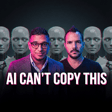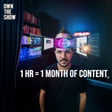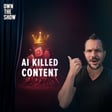
Hallucinations to Innovations: Generative AI's Dual Nature w/Noz Urbina
In this episode of the AI-Driven Marketer, Dan Sanchez talks to Noz Urbina, an AI consultant with extensive experience in technical documentation, about leveraging generative AI for marketing tasks like creating personas and dream maps. They discuss how AI can empower small companies to outpace larger competitors, the potential improvements in AI's working memory and context length, and the role of external tools like knowledge graphs. Noz emphasizes the importance of adapting to new concepts and processes to maximize AI's capabilities, while Dan shares his insights on using custom GPTs and the need for a process-driven mindset. Tune in to explore the intersection of AI and marketing, and gain strategies to implement AI innovatively in your workflow.
Timestamps:
05:47 Limitations in marketing automation are overcome by AI.
09:07 AI cycle integrates tech with human collaboration.
10:52 Internship experience impacts leveraging AI and automation.
15:58 Language model can't capture all nuances accurately.
19:31 Powerful generative AI essential for big business.
21:18 Google panel populates various brand information sources.
25:19 Small players innovate, data management challenges ahead.
27:51 Content marketing focuses on user experience and value.
33:23 Leverage external tools for AI and knowledge.
37:21 Tips for AI development: Use specialized AIs.
39:52 Specific custom GPT performs better for show.
43:21 Questioning continuation of GPT without value.
45:58 Meeting customer demands for omnichannel content formats.



![What’s Your Authority Score? [The 5-Factor Test] image](https://media.zencastr.com/cdn-cgi/image/width=112,quality=85/image-files/630c9f06819f8b3dba5fa460/cfbaccba-f587-45de-a41f-e2c99c15e2a5.png)
![The Audience Growth Engine [Full Framework] image](https://media.zencastr.com/cdn-cgi/image/width=112,quality=85/image-files/630c9f06819f8b3dba5fa460/46b84fd1-e856-4687-9aee-6b4a7e0bc7ff.png)



![The "Dream 100" Execution Plan [Google Sheet System] image](https://media.zencastr.com/cdn-cgi/image/width=112,quality=85/image-files/630c9f06819f8b3dba5fa460/fcd89374-76a4-4e58-a2e3-2bb7ddda4364.png)










